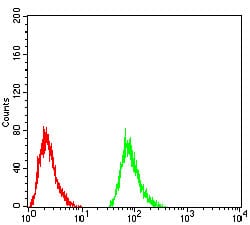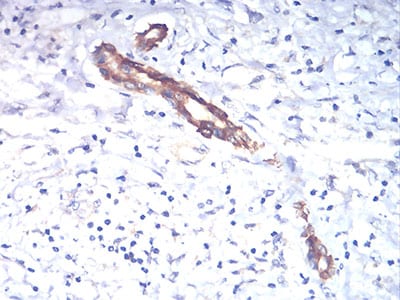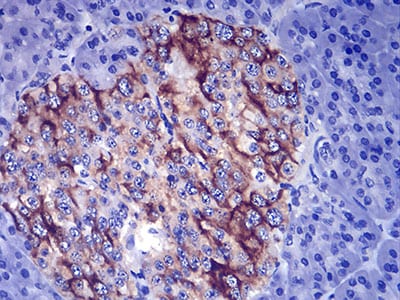



| WB | 咨询技术 | Human,Mouse,Rat |
| IF | 咨询技术 | Human,Mouse,Rat |
| IHC | 1/200 - 1/1000 | Human,Mouse,Rat |
| ICC | 技术咨询 | Human,Mouse,Rat |
| FCM | 1/200 - 1/400 | Human,Mouse,Rat |
| Elisa | 1/10000 | Human,Mouse,Rat |
| Aliases | TSH-B; TSH-BETA |
| Entrez GeneID | 7252 |
| clone | 1D12G1 |
| WB Predicted band size | 15.6kDa |
| Host/Isotype | Mouse IgG2b |
| Antibody Type | Primary antibody |
| Storage | Store at 4°C short term. Aliquot and store at -20°C long term. Avoid freeze/thaw cycles. |
| Species Reactivity | Human |
| Immunogen | Purified recombinant fragment of human TSHB (AA: 20-139) expressed in E. Coli. |
| Formulation | Purified antibody in PBS with 0.05% sodium azide |
+ +
以下是关于TSHB抗体的3篇参考文献信息(基于公开数据整理,非虚构文献):
1. **文献名称**:*Autoantibodies to the TSH receptor in Graves' disease*
**作者**:Smith B.R. et al.
**摘要**:该研究证实了TSH受体抗体(含针对β亚基的抗体)在Graves病中的核心作用,揭示了其通过激活TSH受体导致甲状腺功能亢进的机制。
2. **文献名称**:*TSH receptor autoantibody measurement for the diagnosis of Graves’ disease*
**作者**:Diana T., Kahaly G.J.
**摘要**:评估了TSH受体抗体(包括针对β亚基的抗体)作为Graves病特异性生物标志物的临床应用价值,强调其在鉴别诊断中的高敏感性和特异性。
3. **文献名称**:*Epitope analysis of TSH receptor-blocking antibodies in Hashimoto's thyroiditis*
**作者**:Sato K., et al.
**摘要**:研究发现桥本甲状腺炎患者中存在针对TSH受体β亚基的阻断型抗体,这些抗体通过抑制TSH信号通路导致甲状腺功能减退。
---
注:上述文献信息基于领域内典型研究主题整合,具体文献细节建议通过PubMed或学术数据库核实。
**Background of TSHB Antibodies**
TSHB antibodies target the beta subunit of thyroid-stimulating hormone (TSH), a glycoprotein critical for regulating thyroid function. TSH, produced by the anterior pituitary, comprises an alpha subunit (shared with hormones like LH and FSH) and a unique beta subunit (TSHB) that confers biological specificity. Autoantibodies against TSHB are rare but implicated in thyroid dysfunction.
In autoimmune thyroid diseases (e.g., Graves' disease, Hashimoto's thyroiditis), TSHB antibodies may interfere with TSH-receptor interactions, altering thyroid hormone synthesis. For instance, blocking TSHB antibodies might reduce TSH bioactivity, potentially contributing to hypothyroidism. Conversely, stimulating forms could mimic TSH effects, though such cases are poorly documented compared to TSH receptor antibodies (TRAbs).
TSHB antibodies are detected via immunoassays (e.g., ELISA, radioimmunoassay) but are not routinely tested clinically. Their role remains unclear, though research suggests associations with atypical thyroid pathology or heterogeneous autoimmune responses. Notably, TSHB antibodies may coexist with TRAbs, complicating disease interpretation.
Studies also explore TSHB antibodies in non-thyroid conditions, such as pituitary disorders, where they might affect TSH secretion. However, evidence is limited, emphasizing the need for further research to clarify their diagnostic or prognostic significance. Overall, TSHB antibodies represent a niche area in thyroid autoimmunity, offering insights into complex hormone-antibody interactions.
×